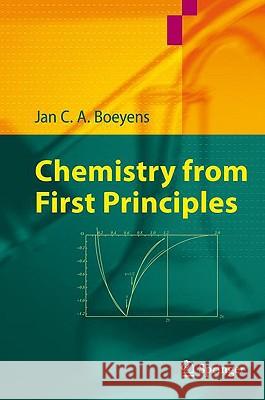Chemistry from First Principles » książka
Chemistry from First Principles
ISBN-13: 9781402085451 / Angielski / Twarda / 2008 / 340 str.
The book consists of two parts: A summary and critical examination of chemical theory as it developed from early beginnings through the dramatic events of the twentieth century, and a reconstruction based on a re-interpretation of the three seminal theories of periodicity, relativity and quantum mechanics in chemical context. Anticipating the final conclusion that matter and energy are special configurations of space-time, the investigation starts with the topic of relativity, the only theory that has a direct bearing on the topology of space-time and which demonstrates the equivalence of energy and matter and a reciprocal relationship between matter and the curvature of space. Re-examination of the first quantitative model of the atom, proposed by Bohr, reveals that this theory was abandoned before it had received the attention it deserved. It provided a natural explanation of the Balmer formula that firmly established number as a fundamental parameter in science, rationalized the interaction between radiation and matter, defined the unit of electronic magnetism and produced the fine-structure constant. These are not accidental achievements and in reworking the model it is shown, after all, to be compatible with the theory of angular momentum, on the basis of which it was first rejected with unbecoming haste. The Sommerfeld extension of the Bohr model was based on more general quantization rules and, although more successful at the time, is demonstrated to have introduced the red herring of tetrahedrally directed elliptic orbits, which still haunts most models of chemical bonding. The gestation period between Bohr and the formulation of quantum mechanics was dominated by the discovery and recognition of wave phenomena in theories of matter, to the extent that all formulations of the quantum theory developed from the same classical-mechanical background and the Hamiltonian description of multiply-periodic systems. The reasons for the fierce debates on the interpretation of phenomena such as quantum jumps and wave models of the atom are discussed in the context of later developments. The successful, but unreasonable, suppression of the Schrodinger, Madelung and Bohm interpretations of quantum theory is shown not to have served chemistry well. The inflated claims about uniqueness of quantum systems created a mystique that continues to frighten students of chemistry. Unreasonable models of electrons, atoms and molecules have alienated chemists from their roots, paying lip service to borrowed concepts such as measurement problems, quantum uncertainty, lack of reality, quantum logic, probability density and other ghostlike phenomena without any relevance in chemistry. In fact, classical and non-classical systems are closely linked through concepts such as wave motion, quantum potential and dynamic variables. The second part of the book re-examines the traditional concepts of chemistry against the background of physical theories adapted for chemistry. An alternative theory is formulated from the recognition that the processes of chemistry happen in crowded environments that promote activated states of matter. Compressive activation, modelled by the methods of Hartree-Fock-Slater atomic structure simulation, leads to an understanding of elemental periodicity, the electronegativity function and covalence as a manifestation of space-time structure and the golden ratio. Molecular structure and shape are related to orbital angular momentum and chemical change is shown to be dictated by the quantum potential. The empirical parameters used in computer simulations such as molecular mechanics and dynamics are shown to derive in a fundamental way from the relationship between covalence and the golden ratio, which also explains the physical basis of Pauli s exclusion principle for the first time."











